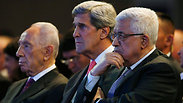
Poll finds general distrust among Israelis in US-mediated peace talks
64% of Israelis do not trust Kerry to take Israel's security needs into account, while 60% think the US secretary of state is motivated by personal reasons.
There is a general distrust among Israelis in the American-mediated peace talks with the Palestinians, according to a joint poll conducted by the Israel Democracy Institute (IDI) and Tel Aviv University, and published Tuesday.
Some two-thirds of Israelis (64 percent) said they do not trust US Secretary of State John Kerry to take Israel's security needs into account as a crucial factor in his proposed framework agreement. Among those were 66% of Israeli Jews and 53% of Arab Israelis.
This is a significant change to an IDI poll from December, that found that 64% of Israeli Jews and 78% of Arabs Israelis believe the US, and particularly Kerry, are committed to ensuring Israel's security in negotiations.
The change can be attributed to the fast-approaching American-set due date for the peace talks, April 29, and to American admission it is unlikely a final accord will be signed by that date, despite initial optimism at the talks' start. The proposed framework agreement is meant to lay out the guidelines for an additional round of talks.
In addition, tensions have been rising between Israel and the Palestinians in recent months, with a trickle of rockets being fired from the Gaza Strip, a terror tunnel built to facilitate the kidnap of IDF troops that was found by the IDF under Israel's border with Gaza, and terror attacks emanating from both the West Bank and the Gaza Strip.
Related stories:
- Israelis pessimistic over peace process
- Poll: Two-thirds of Israelis believe US is committed to Israeli security in peace talks
- Poll: 69% of Americans against US involvement in peace talks
In the current poll, meanwhile, 60% of Israelis share Defense Minister Moshe Ya'alon's view that Kerry's main motivation for reaching a framework agreement is a personal interest in making history as a statesman where others have failed. Only 21% believe that Kerry is motivated by an honest concern for the future of the two sides.
A majority of Israeli Jews (74%) think the Americans putting more pressure on Israel to accept the framework agreement than they are on the Palestinians. Just 12% think the US is equally pressuring both sides and only 5% think the Palestinians are the ones who get the lion share of American pressure.
Among Israeli Arabs, opinions are varied. Less than one third (29%) think the Americans press Palestinian Authority President Mahmoud Abbas more strongly than they do Prime Minister Benjamin Netanyahu. Twenty-six percent think both sides are equally pressured, and 25% think the Americans press Israel more.
Among Israeli Jews, opinion is split on whether or not Israel should show flexibility towards the framework agreement. Fifty percent believe Israel should show more flexibility in order to avoid a clash with the US, while only 46% think Israel should not show flexibility.
There are two main contested points in Kerry's framework draft that require flexibility: the Palestinian demand for a settlement freeze and the Israeli demand for the Palestinians to recognize Israel as a Jewish state.
Almost half of Israeli Jews (49%) would be willing to support a continued settlement freeze if that ensures the continuation of peace talks, while 47% of Israeli Jews objected to a settlement freeze to facilitate Israeli-Palestinian negotiations.
Netanyahu has been very adamant on his demand for a Palestinian recognition of Israel as a Jewish state, while PA President Abbas, who on Monday won his party's support, has vehemently objected to that demand, saying it would jeopardize Palestinian refugees' right to return home.
When offered an alternative of the Palestinians recognizing Israel as "the national home of the Jewish people" in the framework agreement, 53% of Israeli Jews opposed it, while 40% were in favor of it.
A lone ray of hope could be found in the fact 68% of Israeli Jews and 43% of Arab Israelis said they will accept the framework agreement, even if it contradicts their political stance, if it is approved by both the government and in a referendum. Twenty-three percent of Israeli Jews and 43% of Arab Israelis said they will actively try to prevent the framework deal's implementation if it contradicts their political position, even if is approved by both the cabinet and a public vote.
The survey was conducted March 3-4 and included 603 respondents. The measurement error for a sample of this size is 4.1%.










